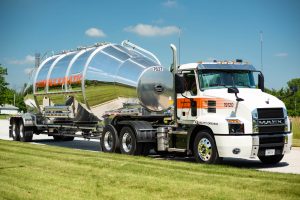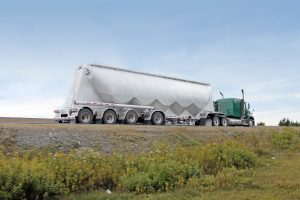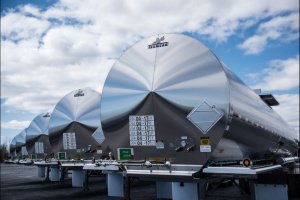- Discover how advanced specialized hauling training and simulation-based instruction reshape the skill set of skilled tank haulers.
- Uncover the influence of driver mentorship programs and flexible scheduling on long-term workforce stability.
- Learn how recent infrastructure investments and industry events help fleets implement effective driver retention strategies.
Recruiting and retaining skilled tank haulers remains a critical challenge in an industry marked by driver workforce shortages and increasingly complex regulatory requirements. Today’s tanker fleets grapple with attracting new talent while ensuring existing drivers are equipped to safely transport hazardous materials across diverse routes. By embracing driver retention strategies, implementing specialized hauling training, and promoting long-term professional development, companies can build a robust workforce that thrives on adaptability, safety, and continuous improvement.
For more background on ongoing workforce challenges, explore our coverage on the driver shortage.
How to Recruit Skilled Tank Haulers in Today’s Competitive Market

Investment in training and mentorship transforms novices into skilled tank haulers.
A strong recruitment pipeline begins with transparent job postings that clearly define expectations, compensation, and advancement opportunities. Petroleum transport companies should highlight their commitment to safety compliance measures and flexible driver scheduling to encourage candidates who value both stability and work-life balance. Offering signing bonuses can help attract individuals ready to engage in tanker truck certification programs and embark on a fulfilling career path. Partnering with local training institutions and hosting career fairs also serve as effective ways to broaden the talent pool.
“The Bipartisan Infrastructure Law has allocated substantial funds to upgrade highways and bridges, thereby reducing vehicle wear and tear, improving travel times, and creating safer routes.”
As new legislative measures and infrastructure investments improve road conditions, companies can emphasize these enhancements when recruiting new drivers. Recruiters may also reference industry events such as the National Tank Truck Carriers (NTTC) Annual Conference & Exhibits, where the latest best practices, compliance updates, and networking opportunities come together to help them identify emerging talent pools.
Enjoying our insights?
Subscribe to our newsletter to keep up with the latest industry trends and developments.
Stay InformedTo gain additional insights on effective driver recruitment initiatives, check out our analysis of driver recruitment strategies.
The emergence of formal learnership programs, like those offered by some tank hauling companies (e.g., Reef Tankers’ learnership initiatives), provides a structured path for new recruits to gain both theoretical knowledge and hands-on training. By promoting these programs, employers signal their dedication to professional growth and workforce development, further enhancing their recruitment appeal.
What Role Does Training Play in Upskilling Skilled Tank Haulers?

Flexible scheduling supports driver well-being while boosting retention
Training is pivotal as new technologies and evolving standards demand that drivers possess far more than basic hauling skills. Simulation-based instruction provides immersive scenarios that replicate hazardous material hauling conditions, allowing drivers to practice in a risk-free environment. Advanced driver training focuses on compliance standards and regulatory requirements that keep tanker fleets aligned with industry mandates. Robust onboarding programs and ongoing education ensure even experienced drivers keep pace with innovations ranging from automated safety systems to E-log devices, enhancing their professionalism and overall performance.
Learn more about emerging approaches to professional development and training in the industry by exploring our truck driver training page.
Ongoing training opportunities now also encompass broader skill sets that extend beyond the wheel, including digital literacy and familiarity with emerging safety software. With the increased emphasis on sustainability and advanced technology—such as autonomous vehicles and connected infrastructure—trainers increasingly incorporate forward-looking modules. Conferences organized by organizations like the American Trucking Associations and industry-specific gatherings provide platforms to learn about:
- The latest simulation-based instruction tools
- Cutting-edge compliance methods
- Newest route optimization software

Formal learnerships signal a long-term commitment to professional growth
Moreover, as companies prepare for future regulatory changes and the integration of next-generation hauling vehicles, tanker truck certification processes become more rigorous. These certifications are expanding to include updated safety protocols , eco-efficient driving techniques, and enhanced load management strategies. By featuring these advanced training elements, companies demonstrate their commitment to upskilling drivers so they remain relevant in a constantly evolving market.
Implementing Mentorship Programs for Skilled Tank Haulers
Mentorship initiatives can significantly improve driver retention strategies and strengthen workforce quality. Seasoned veterans pass down knowledge gained through years of handling chemical logistics and navigating complex routes. Formalized driver mentorship programs help newer recruits assimilate into company culture, learn best practices for risk mitigation, and gain confidence as they progress through specialized hauling training sessions. This knowledge transfer does more than refine technical skills—it fosters camaraderie, loyalty, and a sense of shared purpose within the driver community.
Stay informed on the broader tank hauling sector by visiting our tanker-focused news and insights.

Continuous education keeps drivers current with evolving safety standards.
As some companies implement structured learnerships alongside mentorship initiatives, recruits benefit from multiple layers of guidance. Veterans can offer practical tips on:
- Route planning
- Cargo handling
- Regulatory compliance
Meanwhile, the formal curriculum ensures learners meet standardized competence benchmarks. Industry events and networking sessions further allow mentors and mentees to connect with peers, share insights on evolving regulatory frameworks, and stay updated on new safety initiatives introduced at conferences like the NTTC Annual Conference.
For more information on how NTTC influences industry standards, check out our coverage of NTTC-related news.
Leveraging Technology to Train Skilled Tank Haulers

Safety compliance measures help fleets stand out as employers of choice.
As the industry evolves, so must training methodologies. Simulation-based instruction helps replicate real-world conditions, allowing drivers to practice under various weather scenarios, cargo loads, and emergency simulations without compromising safety. Online modules and mobile learning apps provide on-demand resources for mastering tanker truck certification requirements, while telematics systems offer instant feedback on driving performance. By integrating technology into every phase of development, fleets ensure their skilled tank haulers stay agile, informed, and ready to handle any operational complexity.
In recent years, infrastructure upgrades have dovetailed with technological advancements, ensuring that high-tech training tools accurately reflect on-the-road realities. Improved road conditions, newly installed safety features on bridges, and better rest facilities feed into more realistic simulation experiences. Companies investing in virtual reality (VR) training scenarios can now mirror updated regulatory requirements, emerging hazard mitigation strategies, and advanced route optimization techniques. This alignment between technology-driven training and infrastructural improvements allows drivers to seamlessly transition their learning into practical on-road efficiency.
Learn more about how infrastructure improvements shape industry practices by reading our latest updates on infrastructure trends.
How Signing Bonuses Attract Skilled Tank Haulers
Signing bonuses provide a tangible incentive for qualified candidates seeking stable, long-term opportunities. These financial benefits underscore a company’s commitment to investing in drivers from day one, making it easier to stand out in a crowded hiring market. Over time, as new hires engage with advanced driver training and build proficiency through mentorship initiatives, these drivers are more likely to remain loyal, helping companies address persistent driver workforce shortages.

Data-driven insights refine strategies for sustained workforce stability.
Companies can further enhance their appeal by emphasizing the improved highway infrastructure and upgraded rest stops, which contribute to a safer, less stressful driving environment. By connecting these tangible improvements in working conditions to financial incentives, recruiters showcase a comprehensive package that values drivers’ professional development, physical safety, and overall well-being. Some fleets may also highlight partnerships with local training institutions or reference newly launched industry scholarships and sponsorships for achieving certifications.
Flexible Scheduling Options for Skilled Tank Haulers
Flexible driver scheduling can alleviate the physical and mental pressures of the job. By rotating routes, adjusting shift durations, or offering more predictable off-duty periods, fleets support driver fatigue management and improve job satisfaction. This responsiveness helps stabilize the workforce and aligns with evolving regulations designed to safeguard both drivers and the communities they serve. Ultimately, flexible scheduling ensures that skilled tank haulers maintain high performance without compromising their well-being.
Incorporating insights from workforce trend reports and HR guidance found through organizations like SHRM, companies tailor schedules that consider family commitments, health needs, and personal preferences. This human-centric approach to scheduling, combined with infrastructure investments that reduce delays and congestion, results in more predictable transit times. When drivers know they can rely on improved roads and rest areas, flexible scheduling becomes even more appealing, turning challenging routes into manageable assignments.
Fostering a Safety Culture Among Skilled Tank Haulers

Integrating training, incentives, and flexible hours fosters a thriving driver community.
Establishing a strong safety culture is essential to retaining experienced professionals. When fleets emphasize safety compliance measures and invest in ongoing education, they show a clear commitment to driver well-being. Regular workshops, refresher courses, and performance assessments reinforce best practices for hazardous material hauling. By maintaining an unwavering focus on safety, companies position themselves as employers of choice for top-tier talent who seek stability, respect, and continual growth.
Industry conferences, such as the NTTC Annual Safety Meeting, allow safety professionals and fleet managers to:
- Share emerging best practices
- Discuss regulatory updates
- Highlight successful case studies
These events, coupled with newly implemented infrastructural improvements and technology-driven training modules, ensure drivers consistently receive the most current and practical safety guidelines. Enhanced safety measures also help address public concerns and regulatory scrutiny, bolstering the reputation of fleets dedicated to maintaining the highest standards of care.
To explore strategies for improving safety metrics, examine our section on fleet safety best practices.
Tracking Long-Term Success of Skilled Tank Haulers Retention

Modern simulation-based instruction prepares drivers for complex operational demands
Data-driven insights enable companies to measure the effectiveness of their strategies over time. Monitoring driver turnover rates, evaluating feedback from mentorship initiatives, and assessing outcomes from specialized hauling training help refine future policies. By leveraging analytics, fleets can optimize their approaches to recruitment, ongoing education, and flexible scheduling, ultimately maximizing workforce stability. This consistent refinement ensures that skilled tank haulers, once onboarded, remain enthusiastic contributors who propel the industry forward.
As policy committees convene at industry forums—such as the American Trucking Associations Mid-Year Management Session—managers can benchmark their internal metrics against broader industry data. This engagement sparks innovation, leading to refinements in training programs, mentorship structures, and incentive packages. The ongoing dialogue among industry peers, coupled with the infusion of best practices identified at these conferences, ensures that data-backed strategies evolve alongside changes in legislation, infrastructure quality, and technological capabilities.
Conclusion
Creating a workforce of skilled tank haulers is an ongoing endeavor that requires a holistic approach. By emphasizing thorough training, embracing modern technologies, investing in driver mentorship programs, and offering incentives like signing bonuses and flexible scheduling, companies lay the groundwork for a thriving environment. As regulatory requirements evolve and transport demands intensify, sustained focus on professional development will enable tanker fleets to overcome driver workforce shortages, maintain compliance, and ensure that the next generation of qualified drivers is ready to rise to any challenge.
The integration of learnership programs, insights from industry events, and infrastructure investments all converge to strengthen the industry’s talent pipeline. Through careful coordination of training, mentorship, and safety-focused strategies, fleets not only attract and retain top-tier drivers but also contribute to a more resilient, efficient, and forward-looking tank hauling sector. By merging these efforts with cutting-edge simulation-based instruction, advanced technology platforms, and continuous professional development initiatives, the industry positions itself to adapt to future trends, including autonomous driving technologies, sustainable fuels, and evolving regulatory frameworks with confidence and competence.
For a broader perspective on the tank transport sector, visit our dedicated Tank Transport news section.
Key Developments to Close the Driver Gap and Advance Skilled Tank Haulers
- Enhanced training pathways with simulation-based learning.
- Formalized mentorship initiatives encouraging knowledge transfer.
- Signing bonuses and incentives to attract top-tier talent.
- Flexible scheduling to reduce fatigue and improve driver satisfaction.
- Rigorous safety compliance measures and continuous education.
Explore Authoritative Resources on Specialized Tank Hauling Operations
- Learn about federal compliance standards and safety requirements from the Federal Motor Carrier Safety Administration (FMCSA).
- Gain insights into infrastructure policies and funding efforts at the U.S. Department of Transportation.
- Understand hazardous materials regulations and guidelines for tank haulers through the Pipeline and Hazardous Materials Safety Administration (PHMSA).
- Review safety protocols and workplace standards relevant to tanker operations at the Occupational Safety and Health Administration (OSHA).
- Explore industry research, data, and best practices influencing driver training and retention at the American Transportation Research Institute (ATRI).
- Find additional guidance on handling petroleum products and maintaining equipment integrity at the American Petroleum Institute (API).




















